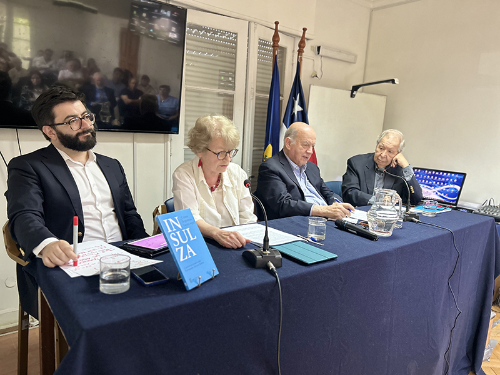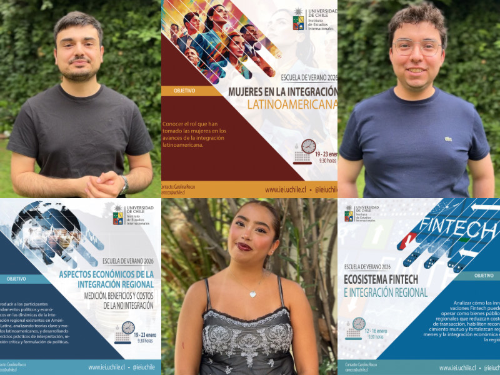This lecture is presented at a moment in which an overwhelming number of studies admit that “climate change is already affecting the human relationship with land and water”. We experience “climate-induced shocks”, characterized – as scientific and technical assessments acknowledge - by intense periods of heat or flood events that surpass previous experiences, and other phenomena, such as elevated night-time temperatures, that have impacts on agricultural production and that are more incremental in nature. These are all elements to consider in the protection of global climate as a common concern of humankind.
In the IPCC sixth assessment report on Climate Change 2021, the Physical Science Basis, it is said that there have been detectable changes in the global water cycle since the middle of the twentieth century associated to human induced climate change. In this scenario, land and water management plays a significant part as changes may be triggered through modified carbon and nutrient cycles, GHG emissions, and control over the distribution of freshwater across and within the Earth’s crust. Some of these subjects were addressed by States and organizations participating int the current proceedings initiated by the advisory opinion request submitted by the Commission of Small Island States before the International Tribunal for the Law of the Sea, to which I cannot refer at this stage.
From an international legal perspective, based on the assumptions and findings already introduced, it appears that there are key dimensions to consider in regard of this subject. Some of these are already well studied by renowned academics and have also been brought to our attention through the lengthy process of law creation and clarification by negotiations, conferences, declarations, academic opinions, and treaties.
Bearing in mind this background, I will address selected topics that indicate a noticeable relationship with the core subjects of water and land in current international relations, including legal relations.
I would like to recall that law – as an organizer and grantor of rights and duties-, is necessarily part of this governance agenda, which considers a diversity of sources, normative systems, as well as entitlements and responsibilities.
Before delving into other dimensions, I would like to a stress a crucial issue which is human rights in water governance. All political, economic, and social assessments share the perspective of water as a vital resource for life and development. In our political environment, this idea embraces the assumption that water can be a source of tensions as well as of cooperation, engineering, and research, together with negotiations and agreements. Water already has a vast presence in the international and subnational agenda, and law is meant to accomplish certain goals and guide the sustainability of human activities.
In this respect, international law is a powerful tool to anticipate and respond in ways that also note the presence of situations of vulnerability and resilience. As the United Nations GA Resolution 70/169 (2016) states, access to safe and clean drinking water and sanitation must be considered as a development of normative values to inform human rights obligations (para. 3).
The United Nations GA Resolution 64/292 of 2010 on Human Right to Water and Sanitation, adopted with no negative votes (with abstentions), employed the expression “Recognizes” to refer to the right to safe and clean drinking water and sanitation as essential for the full enjoyment of life and all human rights. This definition was followed by the Human Rights Council, which the same year introduced the idea that this right is derived from the right to an adequate standard of living and closely related to the right to the highest attainable standard of physical and mental health, as well as the right to life and human dignity.
The pathway to these Resolutions and further declarations had already been traced by the affirmation in some international human rights law instruments, that the elements involved, could be read into the International Covenant on Economic, Social and Cultural Rights, the
Convention on the Elimination of All Forms of Discrimination against Women, the Convention on the Rights of the Child, and the Convention on the Rights of Persons with Disabilities.
All these legal instruments are susceptible to be construed in a way that derives obligations for States parties in relation to access to safe drinking water and sanitation as part of the crucial goals they seek to attain. Much can be said of the value of declarations that, while non-binding in nature, have nevertheless outlined the place and role of water as a vital resource for human beings and have provided the essential elements for its legal definition.
The well-known General Comment N°15 (of 2002), adopted by the Committee on Economic, Social and Cultural Rights, relying upon the International Covenant on Economic, Social and Cultural Rights, would say:
Water is a limited natural resource and a public good fundamental for life and health. The human right to water is indispensable for leading a life in human dignity. It is a prerequisite for the realization of other human rights.
Among those asked to reflect and act upon its scope are States, the productive and financial sectors, individuals, local communities, and groups of persons; and at the level of the organized international community, international organizations and programs designed to foster the integration of these subjects and interests in their intergovernmental work.
It is noticeable that General Comment 15 has set out ambitious dimensions for the accessibility to water. Among those,
- Physical accessibility
- Economic accessibility
- Non-discrimination
- Information accessibility
These dimensions are without prejudice to the various forms of water tenure that may apply in each State or community.
Article 12 of the International Covenant – just to remind it- sets up that “The States Parties to the present Covenant recognize the right of everyone to the enjoyment of the highest attainable standard of physical and mental health”. It also requires that States take measures to achieve this standard, considering urgent matters that affect living conditions. The inference of the right to water and sanitation from this provision has signified to conceptualize the relationship between water and States ‘obligations regarding health and environmental hygiene, among others.
The notion of rights also has its footprints in the 1992 Agenda 21, whose Chapter 18 would place the subject of freshwater resources as an essential component of the Earth's hydrosphere and an indispensable part of all terrestrial ecosystems. This means placing the matter at a high level in the political development agenda. The Agenda included scientific notions about how water has to be appraised within hydrological cycles, including floods and droughts, and that global climate change and atmospheric pollution have an impact on freshwater resources and their availability. As part of the picture, a timely consideration was made regarding the fact that global climate change and atmospheric pollution could have “an impact on freshwater resources and their availability” and, that through sea-level rise, it could threaten low-lying coastal areas and small island ecosystems.
As said before, some of these documents may have a soft law nature, but they are characterized by their political support, consensual merit, and the backing they give to international law.
It is opportune to look at the 1993 Vienna Declaration and Programme of Action which endorsed the universal, indivisible, and interdependent character of human rights. The phrase praised the interconnectedness of these values, and that the international community must treat human rights globally in a fair and equal manner, on the same footing. While bearing in mind that there are national and regional particularities and various historical, cultural and religious backgrounds, the Declaration would affirm that it is the duty of States, regardless of their political, economic and cultural systems, to promote and protect all human rights and fundamental freedoms.
Specifically, water was mentioned as connected to the need to adopt national action plans, together with international efforts, in respect of the rights of the child, along with placing priority “on reducing infant and maternal mortality rates, reducing malnutrition and illiteracy rates and providing access to safe drinking water and to basic education”.
In this context, and returning to law, the abovementioned 2002 General Comment 15 would invite to look at the normative content of this right, considering its content and scope, because it contains both freedoms and entitlements. The freedoms include the right to maintain access to existing water supplies necessary for the right to water, and the right to be free from interferences, from arbitrary disconnections or contamination of water supplies. And concerning entitlement, it includes the right to a system of water supply and management that provides equality of opportunity for people to enjoy the right to water. It is less about the legal status of the provider as to how the right is guaranteed and fulfilled as a matter of law.
These dimensions have a clear implication for current international law, considering its effectiveness challenges. These normative considerations lead us to correlate the right to water with the right to food, and their interlocking role in production processes. As several studies demonstrate, the right to food may provide insights on how to apply and interpret the normative content of the right to water insofar as it extends to food production and agriculture.
A more comprehensive and detailed presentation of this subject should include references to human rights of women, local communities, and indigenous peoples. It is well admitted that implementing the human right to water for food and agriculture is essential for the physical and cultural survival of those communities, and indigenous peoples and/or for the subsistence food production by rural persons, women in particular.
In this regard, I have in mind the 2014 Principles for Responsible Investment in Agriculture and Food Systems, endorsed by the Committee on World Food Security (CFS) (an intergovernmental platform foreseen by the FAO Constitution). Its principle 5 highlights that responsible investment in agriculture and food systems should, inter alia, respect existing and potential water uses, to protect the right to water of all stakeholders concerned. Thus, law seeks a balance between environmental and developmental concerns, according to which subjects of different status should operate and provide goods for human persons and their communities.





